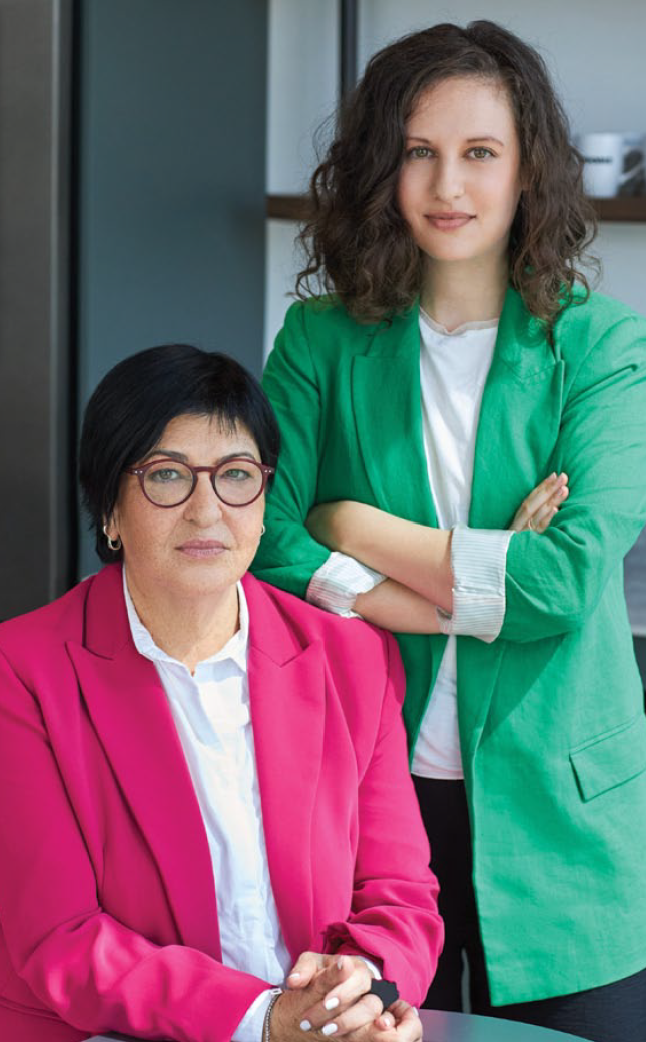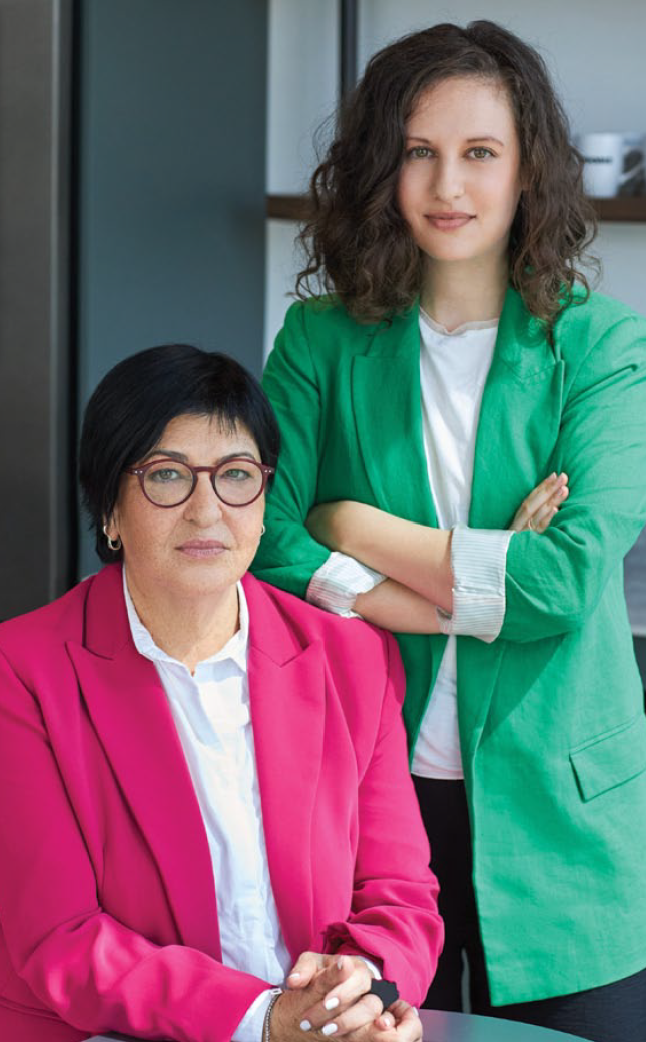
Boarding Pass
Symbiosis C.M’s mission to help our hearts
The female-founded company has raised a total of $450,000 to improve heart valve replacement procedures
“I am a veterinarian in my profession with a vast experience in veterinary cardiology,” explained Dr. Shira Burg, CEO & Founder of Symbiosis C.M. “One of the most challenging cardiac diseases dogs are suffering from is mitral valve insufficiency. The combination of patients' ineligibility for surgical valve replacement, high costs, the amorphic shape of the valve, inability to anchor, and large anatomical variability has led me to create a truly personalized approach for heart valve replacement for humans and animals as one.”
About 65-70% of patients with moderate-severe secondary mitral valve insufficiency are ineligible for mitral valve replacement (surgical or transcatheter), according to Symbiosis C.M. If left undertreated, these patients have a 50% mortality rate within five years and over 90% rehospitalizations due to heart failure.
The company was founded by two women who have a strong medical advisory board with four leading interventional cardiologists and a leading cardiothoracic surgeon. It is looking to raise $5 million for a major milestone: the first trial in humans.
You can learn more about the company below.
Company Name: Symbiosis C.M
Sector: Healthcare
Product/Service description:
A unique minimally invasive platform shaped in real-time to the patient's anatomy for heart valve replacement procedures, solving the major challenge of anatomical variability between patients and within the same patient over time; fitting existing valves in the market for every single patient, increasing their success rate and introducing them into untapped markets.
Founder Bios:
Dr. Shira Burg, CEO & Founder: Veterinarian doctor with a 7-year experience in interventional cardiology, holds a Ph.D. in cardiac electrophysiology. Won several awards (1st place) as a promising young investigator by the Israeli heart association and the international association for heart research. Also won 1st place in the deep tech track, Coller competition for startups.
Varda Badet, Co-Founder and Biz Dev: Former EVP Risk Management at Bank Leumi, MSc in Entrepreneurship, and mentor startups for the past 5 years at Tel Aviv University (Innovation and Entrepreneurship Center).
Year of Founding: 2021
Last Investment Round: $120,000
Last Investment Stage: Pre-Seed
Date of Last Investment: January 2023
Total investment to date: $450,000
Investors (leading and all): Private investors and Award by the Jeremy Coller Foundation
Current number of employees: 3 (+7 advisors)
Open positions: Regulatory advisor, COO, mechanical engineer, CFO.
How was the idea born?
I am a veterinarian in my profession with a vast experience in veterinary cardiology. One of the most challenging cardiac diseases dogs are suffering from is mitral valve insufficiency. The combination of patients' ineligibility for surgical valve replacement, high costs, the amorphic shape of the valve, inability to anchor, and large anatomical variability has led me to create a truly personalized approach for heart valve replacement for humans and animals as one. I had an idea but it wasn't completely "baked"...
A few years ago, my spouse Oded started to work with concrete art; when I saw how he created a bowl by pouring the concrete between two bowls, just like a mold, I thought to myself and said, ‘Hmm.. why not create a frame that will shape to the patient's anatomy in real-time and create that same mold but a flexible one that will harmonize with the cardiac movement and allow a tailor-made solution?’
What is the need for the product?
About 65-70% of patients (6 million patients in the U.S. and Europe) with moderate-severe secondary mitral valve insufficiency are ineligible for mitral valve replacement (surgical or transcatheter). If left undertreated, these patients have a 50% mortality rate within five years and over 90% rehospitalizations due to heart failure (over $40 billion per year in the U.S. alone).
How is it changing the market?
Our unique approach allows a personalized solution for various generic valves that already exist in the market, increasing their success rate and introducing them into untapped markets. Our device will reduce costs in reoperations (~70% of occluding device implantation involves mitral prosthesis), reduce rehospitalization, and eliminate the major costs that are invested by giants in the field into the development of a better anatomical fit of different valves. Our solution standardizes heart valve replacement procedures with a minimally invasive device that simply and naturally adjusts to the anatomy in real-time.
How big is the market for the product and who are its main customers?
Currently we are aiming for the transcatheter mitral valve replacement market with a net value of $3 billion (9 million patients in the U.S. and Europe, aiming specifically for the 6 million that are ineligible for valve replacement), CAGR of 32%. At a later stage, we will aim for the entire heart valve market with a net value of $19.7 billion, a CAGR of 11.1% with over 30 million patients suffering from heart valve disease.
Does the product exist already? If not - at what stage is it and when is it expected to hit the market?
We have a working prototype with a PoC in large animals. It is expected to hit the market in 2029.
Who are the main competitors in this sector and how big are they?
We have two main competitors: Edwards Lifesciences with Sapien M3 and Valcare with the Amend ring. The first is a large corporate leading in the field of structural heart disease, and the second is an Israeli medical device company currently in clinical trials.
What is the added value that the founders bring to the company and the product?
Shira Burg- the main founder: I bring my veterinary knowledge for the preclinical trials (proud to mention that we have achieved our PoC only after 3 animals), academic research skills (Ph.D. in cardiac electrophysiology), creativity, thinking out of the box (some physicians tend to "encapsulate" in their own world and only look at existing solutions and just slightly modify them), implementing and assimilating my medical knowledge from the veterinarian world into the human clinical world (many don't know, but we share many similarities with our little/or not so little furry friends, and a collaboration between the two worlds can create amazing innovation).
Varda Badet: As a former EVP Risk Management at Leumi Bank, Varda brings vast experience and knowledge from the finance world, connections to investors, leading and managing capabilities, negotiation skills, and closing billion-dollar transactions. Moreover, she mentors entrepreneurs in entrepreneurship programs at Tel Aviv University and acts as a true propellor in all aspects of the company.
What will the money coming in from the round be used for?
R&D. The money raised will allow us to begin the chronic experiments in large animals with a minimum of 3-month follow-up. This is a major milestone that will advance us toward a strategic collaboration with giants in the field and FIH.
In the "Startup Boarding Pass" section, CTech will cover the (relatively) small investments made in companies during the early stages of their existence - and the entrepreneurs and startups who have not yet had the opportunity to reveal their stories to the world. Please use the linked form and fill it out according to the guidelines. This form is intended for startups raising between $500,000 and $3 million from venture capital funds, angels, or official grants from Israeli and foreign institutions. If relevant, someone at CTech will be in touch for follow-up questions.














